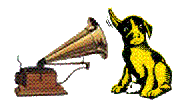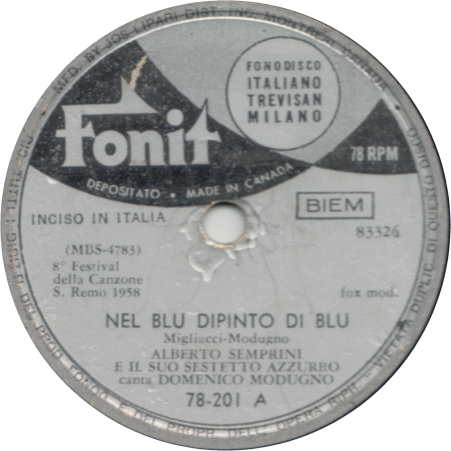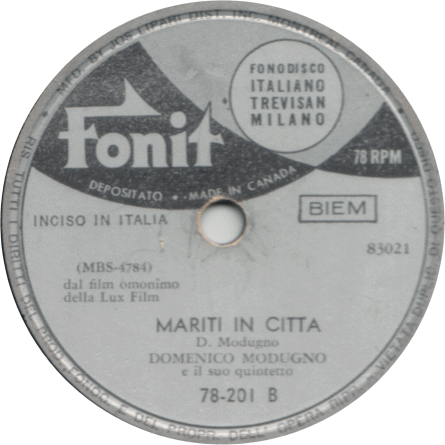
The Beatles
at 78 RPM
|
Cool 78 of the Month May 2009 |
|
Alberto Semprini and his Blues Sextet - singer Domenico Modugno Nel Blu di Pinto di Blu (Volare) Fonit 78-201 (Canada) 1958 |

|
|
It is one of the the world's longest running TV shows, and is seen by an audience of as many as 600 million. It is hated by some and loved by others, but always with a passion and depth of feeling. The Eurovision Song Contest is the grandparent of every musical competition show in the world. While it is regional in nature, its participants representing the member nations of the European Broadcasting Union, within 2 years of its inception it would have international impact.
It was 1958, the courts in Iran ban rock'n'roll, Billie Holiday is arrested and pleads guilty to narcotic charges, and Phil Spector begins his recording carreer. Forty-one years later, the courts of the world still try to suppress what you can and cannot hear, a singer with a soul-filled voice, Amy Winehouse, has problems with drugs, and as to Phil Spector, he is about to begin a new career as a prisoner following a second degree murder conviction. The one other constant through all those years has been a song that would become a signature tune for a 30-year-old Italian composer and singer named Domenico Modugno. Domenico Modugno wanted to be an actor. Like Ronald Reagan, he not only appeared in some films, but would go on to become a politician as he served in the Italian Parliament in the decade prior to his death in the 1990s. And while his political activities did not have the world reaching effect that Reagan's did, a deviation from film to record did. He first signed to RCA and then later would move on to Fonit, the label founded in Milan in 1911 by Mario Trevisan, the name being an acronym for Fonodisco Italiano Trevisan. His Ffrst taste of musical success would be when his composition Lazzarella took first prize at the Festival della Canzone Napoletana, albeit not sung by him. In 1958 he would perform a new song called Nel Blu di Pinto di Blu, more popularly known as Volare, at the Festival della Canzone Italiana a San Remo. It should be noted in 1969, Mary Hopkin, who was signed to the Beatles' Aopple label, placed second with the song Lontano Dagli Occhi. Volare took first prize at the festival and was selected to represent Italy at the Eurovision Song Contest in Hilversum Holland where ten nations participated. Television was not kind to Italy that year, and viewers in some countries were left to believe that Italy's entry was called 'Technical Fault - Do Not Adjust Your Set'. The contest was kind, though, and permitted Modugno to perform Volare a second time. Unlike the televoting of today that has lead to wide spread criticism and the re-institution of a jury for 2009, in 1958 a panel of jurists voted on the song. France came out on top with Dors, mon Amour by André Claveau. This year also saw the first ever entry by Sweden, a nation who's 1974 entry by ABBA would launch them to international superstardom. The song, Lilla Stjärna by Alice Babs would come in fifth. Volare would place between the two, at third. It would, however, eclipse every Eurovision song for years to come. Soon artists around the world began covering it. Later that year Dean Martin would record it for the US market and would reach number 12 in the charts. In 1960, teen heartthrob Bobby Rydell would re-record it for a more youthful audience and take it to number 4. It would even breach the Iron Curtain with a domestic Russian version. Over 100 different versions would be released over the decades since 1958, including Al Martino's 1975 version that went to #33, and Dean Martin re-visit for a disco-ised recording in 1976. As to films, you'll hear Kevin Kline sing a snippet in the movie A Fish Called Wanda. It even featured in TV commercials, and the Chrysler automobile company would name a vehicle in its Plymouth line after the song. The dreamy soundscape created by Domenico would describe the feeling of flying through the blue sky that he had when he was with the girl that he loves. His record label, Fonit, knew that they had a smash on their hands, and soon Volare would be flying out the doors of record shops via a release on Oriole in the UK that reached #10, Decca in the US where it hit number 1, the only Italian language record to ever do so, and surprisingly, as a release on a local version of Fonit in Canada going to number 2 on the CHUM chart in Toronto. The Canadian release, in true international spirit, was manufactured by Joseph Lipari Manufacturing in the French-Canadian city of Montreal. Two variations exist of the label, a primarily blue and silver version, and the black and silver version shown on this page. In other countries, such as those of South America, where Fonit had releases under its own name, usually via Decca, the label was multi-colour. On curious note is the fact that while the label copy does trumpet the success of Volare at the San Remo Festival, it doesn't mention Eurovision, and Domenico Modugno is effectively given second billing as singer to Alberto Semprini and his Blues Sextet! For Volare, the accolades didn't stop there as it would go on to be the number one record of the year in the USA, win two grammys including the first ever record of the year, and get three gold records. The B-Side of the 78 was also a song composed by Modugno, the theme from the Italian film Mariti in Citta. The movie's title, which in English is Husbands in the City, and plot of a group of married men left home alone and to their own devices for their romantic adventures while their wives are away on holiday, could easily have been a plot for another series some 40 years later about such goings on in the city. This side gives fuller credit to Modugno by crediting the recording to him and his quintet. In 2006 when Eurovision looked back at its 50 year history, Volare cam in second as the all time favourite song of the contest. Waterloo by ABBA came in first, but even Benny Anderson of ABBA, Waterloo's composer said that he voted for Volare. With all that going for it, one would think that Italy would be a proud participant at Eurovision. Sadly that is not the case. In shades of other campaigns against rock'n'roll, the Italian broadcaster RAI censored Eurovision over the 1974 entry, Si (Yes), claiming that it contained subliminal messages designed to influence the vote in a referendum on divorce. Other times they have claimed that Italy just had no interest in the contest. Staying true that feeling, they haven't even embraced the copycat Idol franchise that has swept the world. There is interest, though, and 50 year after Volare, former Eurovision winner Toto Cutugno launched a campaign calling for Italy's return. Domenico Modugno would return to Eurovision in 1959 but would only reach number 6 with the song Piove (Cia Ciao Bambina), which we'll look at another day. In 1966 he would try again with the song Dio, come ti amo, but would score the dreaded nul pointes, something in and of itself an honor. He would drift into politics under the Italian Radical Party and represented Turin in parliament in June 1987. He continued to be a social activist, fighting for patients in Italy's metal hospitals until his death in August 1994. In his wake, the sound of Volare flew across the skies and around the world. |
|
B Side Domenico Modugno and his quintet Mariti in Citta |

|
